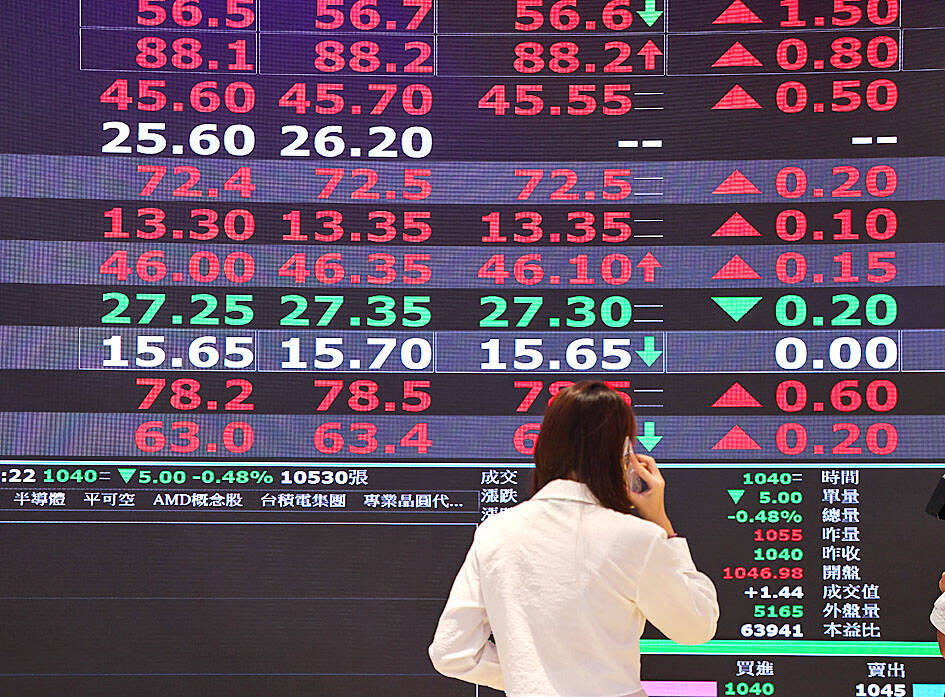The TAIEX yesterday staged a technical rebound after US President Donald Trump postponed tariffs on goods from Mexico and Canada for one month, but gains were capped ahead of 23,000 points, dealers said.
After falling 3.53 percent a session earlier, the TAIEX closed up 99.25 points, or 0.44 percent, at 22,793.96. Turnover totaled NT$408.99 billion (US$12.4 billion).
Led by the electronics sector, investors appeared relieved by Trump’s move to delay a 25 percent tariff on imports from Mexico and Canada for one month, dealers said.

Photo: CNA
However, with the TAIEX moving closer to 23,000 points, some investors shifted to the sell side, while contract chipmaker Taiwan Semiconductor Manufacturing Co (TSMC, 台積電) sustained most of its earlier gains to prevent the broader market from weakening, dealers added.
TSMC, the local market’s most heavily weighted stock, rose 2.34 percent to close at NT$1,095. Its gains represented about 200 points in the TAIEX’s rise.
“Today’s movement showed many investors stayed cautious about Trump’s policies,” Mega International Investment Services Corp (兆豐國際投顧) analyst Alex Huang (黃國偉) said. “Despite the postponement of the tariffs on Mexico and Canada, in the era of an unpredictable Trump, investors simply wanted to wait.”
Application-specific integrated circuit designer Alchip Technologies Ltd (世芯) soared 10 percent, the maximum daily increase, to close at NT$3,245 as the stock was named by some analysts as a beneficiary amid worry over Chinese artificial intelligence company DeepSeek (深度求索).
Also in the technology sector, iPhone assembler Hon Hai Precision Industry Co (鴻海精密) lost 0.3 percent to close at NT$165, and Quanta Computer Inc (廣達), another contract electronics maker, shed 3.29 percent to close at NT$235.
Many old economy stocks limited the upturn on the TAIEX, Huang said.
Among them, Chia Hsin Cement Corp (嘉新水泥) lost 2.03 percent to close at NT$16.85. Formosa Chemicals & Fibre Corp (台化) shed 3.79 percent to close at NT$26.65 and Formosa Petrochemical Corp (台塑石化) closed down 3.35 percent at NT$33.20.
“Market sentiment stayed cautious as investors kept alert over Trump’s threats of massive tariffs on chips,” Huang said. “Investors had better keep more cash on hand now.”
Despite the TAIEX’s rebound, foreign institutional investors yesterday sold a net NT$15.19 billion of shares on the main board, the Taiwan Stock Exchange Corp said.
Asian stock markets also advanced, although unease about the lack of movement on averting the Chinese tariffs saw traders’ pare some of the morning’s gains.
Hong Kong’s Hang Seng Index, which rose more than 3 percent in the morning, closed 2.83 percent higher at 20,789.96, with analysts saying the measures so far would not have a major impact on China’s economy.
Tokyo, Seoul, Manila, Sydney, Mumbai, Bangkok and Wellington also closed higher, while Sydney and Singapore edged down.
Japan’s Nikkei 225 closed 0.7 percent higher at 38,798.37.

GROWING OWINGS: While Luxembourg and China swapped the top three spots, the US continued to be the largest exposure for Taiwan for the 41st consecutive quarter The US remained the largest debtor nation to Taiwan’s banking sector for the 41st consecutive quarter at the end of September, after local banks’ exposure to the US market rose more than 2 percent from three months earlier, the central bank said. Exposure to the US increased to US$198.896 billion, up US$4.026 billion, or 2.07 percent, from US$194.87 billion in the previous quarter, data released by the central bank showed on Friday. Of the increase, about US$1.4 billion came from banks’ investments in securitized products and interbank loans in the US, while another US$2.6 billion stemmed from trust assets, including mutual funds,

AI TALENT: No financial details were released about the deal, in which top Groq executives, including its CEO, would join Nvidia to help advance the technology Nvidia Corp has agreed to a licensing deal with artificial intelligence (AI) start-up Groq, furthering its investments in companies connected to the AI boom and gaining the right to add a new type of technology to its products. The world’s largest publicly traded company has paid for the right to use Groq’s technology and is to integrate its chip design into future products. Some of the start-up’s executives are leaving to join Nvidia to help with that effort, the companies said. Groq would continue as an independent company with a new chief executive, it said on Wednesday in a post on its Web

Even as the US is embarked on a bitter rivalry with China over the deployment of artificial intelligence (AI), Chinese technology is quietly making inroads into the US market. Despite considerable geopolitical tensions, Chinese open-source AI models are winning over a growing number of programmers and companies in the US. These are different from the closed generative AI models that have become household names — ChatGPT-maker OpenAI or Google’s Gemini — whose inner workings are fiercely protected. In contrast, “open” models offered by many Chinese rivals, from Alibaba (阿里巴巴) to DeepSeek (深度求索), allow programmers to customize parts of the software to suit their

JOINT EFFORTS: MediaTek would partner with Denso to develop custom chips to support the car-part specialist company’s driver-assist systems in an expanding market MediaTek Inc (聯發科), the world’s largest mobile phone chip designer, yesterday said it is working closely with Japan’s Denso Corp to build a custom automotive system-on-chip (SoC) solution tailored for advanced driver-assistance systems and cockpit systems, adding another customer to its new application-specific IC (ASIC) business. This effort merges Denso’s automotive-grade safety expertise and deep vehicle integration with MediaTek’s technologies cultivated through the development of Media- Tek’s Dimensity AX, leveraging efficient, high-performance SoCs and artificial intelligence (AI) capabilities to offer a scalable, production-ready platform for next-generation driver assistance, the company said in a statement yesterday. “Through this collaboration, we are bringing two